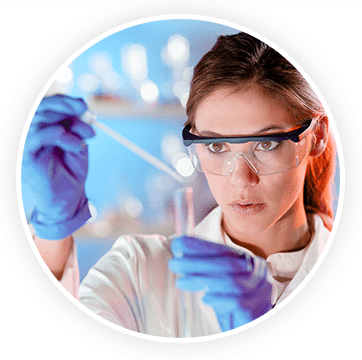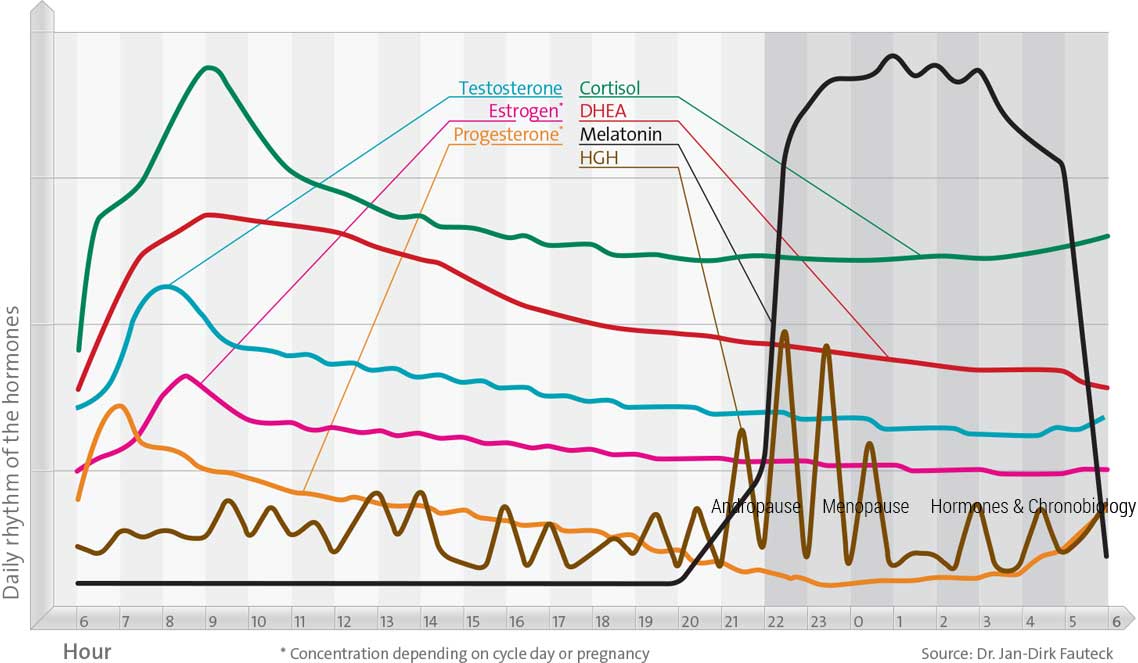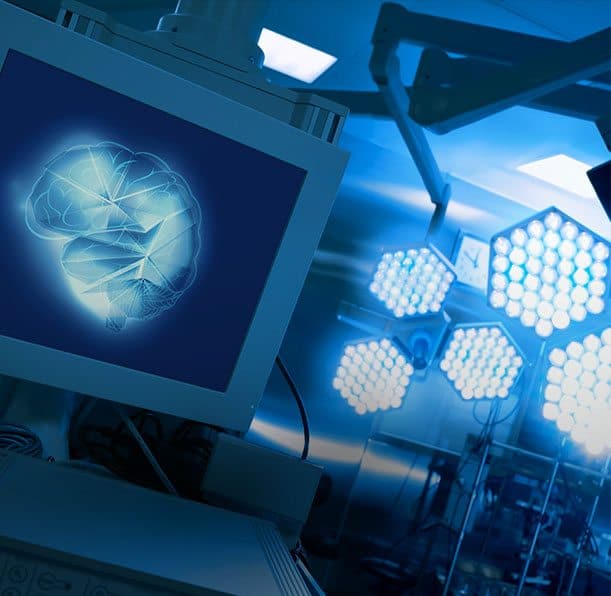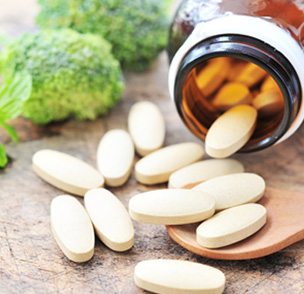The Hormone Science of Aging


The Hormone Science of Aging
The wish to delay aging is thousands of years old. People’s ever-increasing life expectancy, as well as new knowledge and theories concerning the aging process, have massively fostered this interest. In this respect, one of the most interesting questions is: Which changes in the organs are caused by the low hormone levels that characterize the second half of life? By merely looking at the statistics of some physical and mental signs of aging, a convincing answer cannot be found.
Blood circulation is reduced by 20 percent in the brain and by 50 percent in the kidneys. The blood transports only up to a maximum of 60 percent of the former oxygen quantity. The mineral content of the bones in the female body drops to 70 percent. When resting, our basal metabolism consumes 16 percent fewer calories, thus being overweight is imminent.
Theories of Aging
It is not entirely clear why an organism ages at all. Several theories compete for recognition:
- Certain genes control the aging process •
- Aging is due to oxidative stress having got out of control (“reactive oxygen radicals”)
- Aging is a consequence of loss of function due to protein molecules stiffened by blood sugar
- Aging is due to chronic inflammation processes below pain level (“silent inflammation”).
The most controversial theory is the neuroendocrine theory: We age because our hormone levels drop.
But one thing cannot be denied: All illness symptoms that are typical of old age can be offset or slowed down by adequate hormone substitution. Messenger substances are at work day and night to control important life processes such as heat regulation, water balance, respiration, hunger, sleep and sexual functions. In the second half of life, the organism finds it increasingly difficult to perform some of these actions.
We know one common risk factor for illnesses that are going to determine the fate of people in the 21st century is aging.
This applies in particular to arteriosclerosis, osteoporosis, Alzheimer’s disease and cancer. As a logical consequence, preventive medicine must concern itself with the hormone science of aging.
Extended Hormonal Substitution

Substitution of All Decreasing Messenger Substances
One of the most important approaches of this science is extended hormonal substitution, i.e. the replacement of all messenger substances that decrease in the second half of life.
The longest and widest experience has been gained with hormone replacement therapy for women during and after menopause. Some results of HRT studies have shattered the belief in a fountain of youth. It is not sufficient to just compensate a deficiency state or two.
In the meantime, individualization and dosage reduction have become the principles of responsible, broader hormone substitution. Female postmenopause and male andropause are no longer generally classified as an illness caused by a hormone deficiency. Such categorization requires that corresponding clinical symptoms are present and that the specific hormone deficiency has been proven in a chemical laboratory. Then providing individual hormone substitution to elder adults does make sense.
Hormone Status Test
Defining a man’s or a woman’s hormone status by performing a simple blood test can reveal information on their biological age and provide know-how for targeted anti-aging measures. In this respect, the information to be provided by the specialist doctor must meet particularly high standards. It is absolutely necessary to check efficacy at regular intervals.
The responsible way to administer anti-aging medicine is not by ingesting as much as necessary, but as little as possible. If applied properly, hormones are not dangerous. The overall picture must be right: It makes little sense to compensate a deficiency in only one messenger substance.
Hormones and Their Function

These are the hormones used in modern preventive medicine. Their concentration in the body depends not only on the person’s age but also the time of day.
Hormone
Function
Symptom of Deficiency
Administration of Hormones
Estrogen
Estrogen is a highly effective female sexual hormone, as well as a seduction and beauty substance. It is able to bind water in the skin, plus provides heart protection and good bone metabolism.
Hot flashes. Depression. Bone loss. Dry skin.
Administration of estrogen yields better skin (formation of collagen), increases the libido, brightens the mood and reduces heart and osteoporosis risks. For best results, very low doses of natural (instead of synthetic) hormones should be administered over the skin as a patch, cream or gel.
Progesterone
This is the maternity hormone. It brings respiration, bone health, connective tissues and muscles to perfection. It also reduces fears.
Deficiency can lead to a risk of uterus and breast cancer, sleep problems and disturbed water balance.
Progesterone can lead to the prevention of mood swings and protection against excrescences. For best results, natural (instead of synthetic) hormones should be administered.
Testosterone
Testosterone is the most effective male sexual hormone. It drives the libido, plus assists with muscle and bone buildup as well as fat metabolism.
Symptoms of a deficiency can materialize through the loss of performance, depression, sleep problems and fragility of bones.
Testosterone supplementation can lower cholesterol, boost the libido and increase memory capacity.
Growth hormone
The growth hormone is responsible for regeneration, cell growth, muscle buildup and degradation of fat.
Depression and low immunity are results of a deficiency in growth hormone.
Supplementation of growth hormones strengthens immunity and connective tissue (they can be injected or used as a spray, to early stimulate the body’s own production of the hormone).
DHEA
DHEA is of immense importance for a “second youth.” It is the precursor for sexual hormones, bone density, degradation of fat, performance, immune defense and mood.
A lack of DHEA can lead to a profound metabolic disorder, risks for the cardiovascular system and low immunity.
DHEA supplements can improve the patient’s general well-being and libido as well as lowering cholesterol.
Pregnenolone
Pregnenolone is an important precursor substance that has an anti-inflammatory effect and protects against dementia.
Symptoms of a deficiency are exhaustion and arthritis.
Supplementation can improve long-term memory and symptoms of old age.
Melatonin
Melatonin is the parent hormone of chronobiology. It controls the regeneration of all hormone-dependent organs.
Symptoms include an overall disorder of the inner clock, sleep problems and low immunity.
Taking melatonin can strengthen the immune system, it has an antioxidative effect and also brightens the mood.
The Daily Rhythm of Hormones


Regulation and Compensation
All this results in the recommendation to administer hormones early in order to maintain health and to prevent certain consequences of aging.
In the case of substitution, which is a very promising variant of classic hormone replacement therapy, the hormone administered to the body only compensates a deficiency that has been proven. Today it is possible to determine minute quantities of hormones in the blood, saliva, urine and other sources.
Your trusted doctor with specialist training will carefully evaluate your individual hormone status and take into consideration any symptoms and risks.
Protection Against Free Radicals
Only a short while ago, a fateful interaction between hormone deficiency and a reduced defense against free radicals was discovered. This oxidative stress in the organism seems to be a dangerous accelerator of aging. Hot flashes and other symptoms are the signs of increased aggressive oxidation in the tissue.





